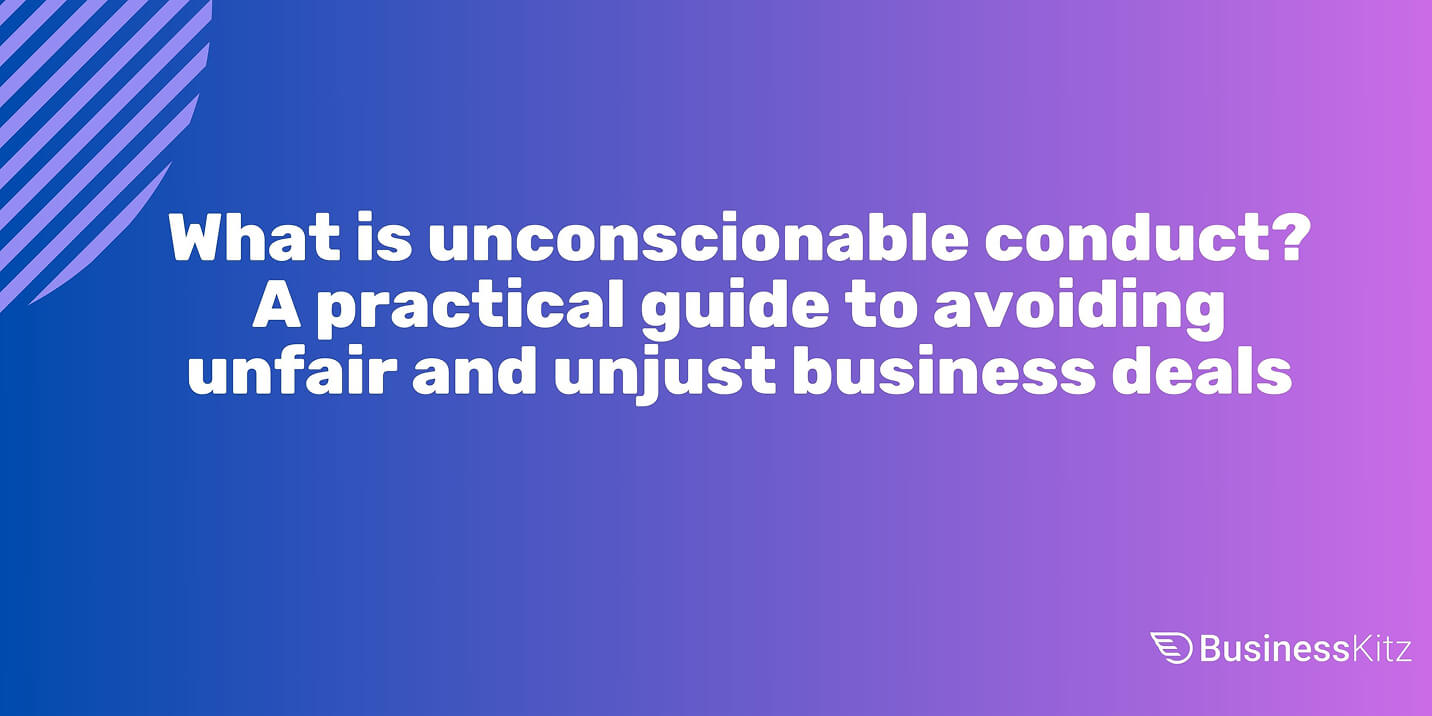
We've helped businesses save $55m with our all-in-one platform. Get instant access to this template and 115+ others, plus AI-powered document creation, starting completely free.
Understanding how unconscionable conduct works in business is key to protecting your rights. Some deals may look fair initially but include terms that harm one party. When power is unbalanced, a contract can cross the line from firm to unjust. This guide explains what unconscionable means in law and how to avoid risky agreements.
Unconscionable means conduct that is harsh, unfair or against good conscience. It often involves one party taking advantage of another’s weakness or lack of power. In law, it relates to behaviour or contract terms that are severely one-sided. Courts may cancel or amend such agreements to protect the weaker party and ensure fair outcomes.
[ez-toc]

To understand unconscionable conduct in law, you must know how it is applied in legislation and court rulings. It has a clear legal meaning in Australia under the Australian Consumer Law (ACL) and common law. It refers to conduct that breaches ethical standards, not just what is simply unfair.
The ACL protects consumers and small businesses from unconscionable conduct. It applies when one party exploits another’s disadvantage—such as a learning disability, lack of education or difficulty speaking English.
Courts also apply the doctrine of unconscionability under equity. This focuses on whether conduct is morally unacceptable, even if not illegal.
Courts assess various factors, including:
Unfair conductUnconscionable conductMinor issues or imbalanceSevere or unscrupulous termsOften still legalCan breach public policyMay not lead to legal actionCan result in remedies or contract changes
Knowing the legal definition of unconscionable helps businesses write fair documents and avoid risky transactions.

Unconscionable conduct happens when one party uses its power to impose harmful terms. It’s not just about being strict. It involves oppressive, misleading or deceptive tactics that breach ethical business standards.
A court may set aside a contract or issue a remedy if it finds conduct crosses the line.
This type of behaviour also affects business-to-business (B2B) arrangements. Even in commercial deals, one party can use power to impose unreasonable terms.
A court may void or alter a contract with severely unfair conditions.
A small retailer signed a lease with a shopping centre operator. The lease had strict penalties and performance rules. The retailer had a learning disability and did not grasp the full terms. The Supreme Court later found the contract unconscionable under Australian contract law and awarded relief.
This case shows how unconscionable conduct can extend beyond consumer protection.
Australian law offers strong protection against unjust commercial conduct. The ACL and common law allow action when conduct offends good conscience.
The Australian Competition and Consumer Commission (ACCC) investigates reports and can take businesses to court. It acts when conduct breaches public policy or harms a weaker party.
If a court finds conduct is considered unconscionable, remedies may include:
Protected partiesEnforcementConsumers, small businessesACCC investigations and legal actionThose with special needs or lack of adviceCourt orders or contract changes
These protections help ensure that contracts are not grossly oppressive or unacceptable.
The word unconscionable appears in many business and legal documents. It defines conduct or terms a court might find unreasonable or oppressive.
Understanding the meaning of unconscionable and how it applies in usage helps you make better decisions and avoid entering an unconscionable contract.

Unconscionable conduct can damage your business. Poor documents often include hidden or grossly unfair clauses. Business Kitz helps prevent this through well-drafted, easy-to-use templates.
FeatureHow it protects youPlain languageReduces confusion and avoids unjust termsBalanced structurePrevents one-sided termsCompliance-first designSupports Australian consumer lawEditable documentsTailor terms without losing fairnessDigital toolsEasy signing and document access
Yes. Even if a contract follows legal steps, a court can still decide the terms go too far. If a term is grossly unfair, a court may say the agreement to be unconscionable. The law protects fair dealing, not just formality.
Unconscionable behaviour happens when one party uses power to take unfair advantage of another. This can include harsh terms, pressure to sign or hiding important details. A court may find a contract unconscionable if the terms go beyond hard bargaining and cause actual harm. The unconscionable definition goes further than what is simply unfair.
'Unconscionable' often appears in legal clauses, especially in contracts for goods or services. It may describe terms that courts can review and cancel. It links to how terms affect parties, not just the wording itself. For a contract to be unconscionable, it needs more than harsh language—it must show actual harm or substantive imbalance.
A court makes that decision based on facts. The court looks at power differences, pressure used and the impact of the deal. The final judgment rests on whether the conduct broke standards of fair dealing and good conscience.
Every business must understand unconscionable conduct. It leads to unfair contracts, legal exposure and lost trust. You don’t need to be a lawyer to spot risks—you just need the right tools. Always review your terms. Stay alert to imbalance and pressure tactics. Fair deals support long-term success. Start with documents you can trust. Don’t wait for problems to arise. Protect your business with legally sound documents from Business Kitz.
Copyright © 2025 Business Kitz 14312161